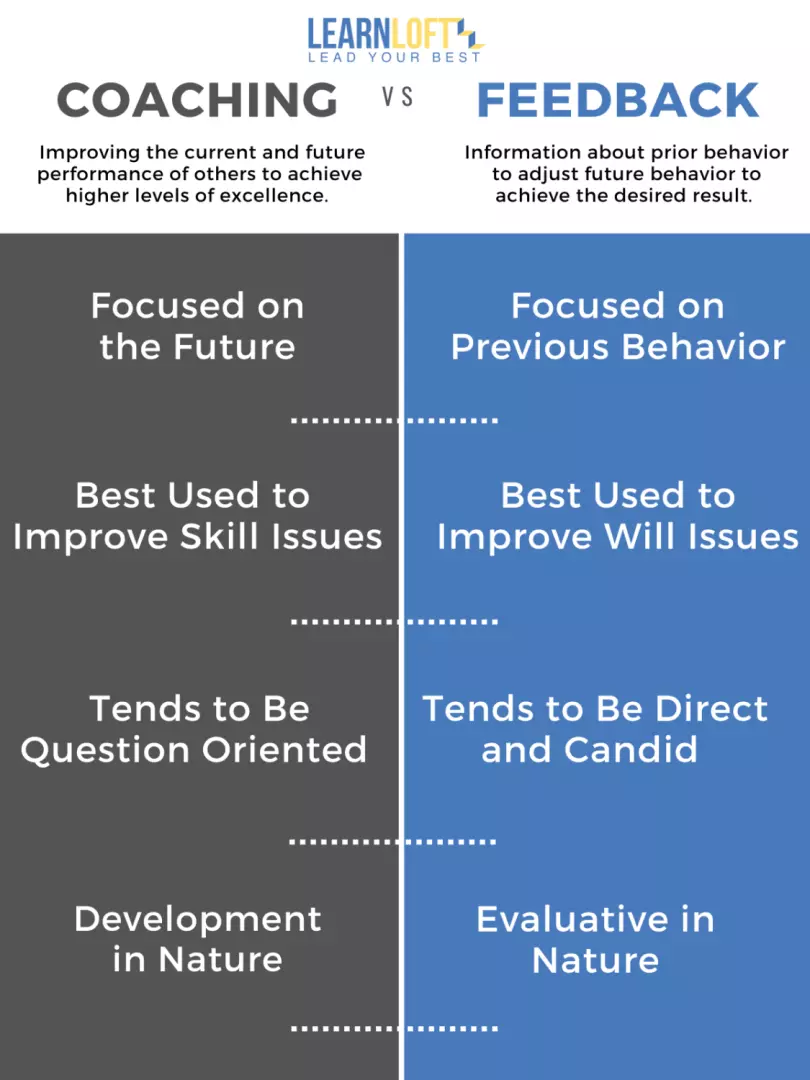Comments
- No comments found

Do you ever feel like a team member is underperforming?
Welcome to the leadership club. It's likely your team member feels it as well. They are frustrated by their lack of success which creates doubt about whether they are good enough to do the job. Beyond those painful feelings, team members feel alone, disconnected, and unengaged when they don't have someone in their corner to help them improve.
The remedy is for managers to start behaving like a coach. To put it bluntly, stop acting like they are the person who can fire employees and start behaving like the person who will help people get promoted.
Stop acting like you are the person who can fire employees and start behaving like the person who is going to help them get promoted.
As easy as this is to write, its application is complex. Most managers default to typical management activities instead of coaching. Ray Smith said it well, "to create a high-performance team, we must replace typical management activities like supervising, checking, monitoring, and controlling with new behaviors like coaching and communication." Not only is he correct, but he also exposes a drastic shift managers must make in today's workplace around helping their employees thrive.
In the Q&A portion of the Coaching for Excellence Workshop, one of the participants asked an important question. "What's the difference in coaching versus feedback?" It turns out many managers think they are coaching when in fact, they are just giving feedback.
Coaching is a form of development. The first use of the term "coach" in connection with an instructor or trainer arose around 1830 in Oxford University slang for a tutor who "carried" a student through an exam. The word "coaching" thus identified a process used to transport people from where they are to where they want to be. In Coaching for Excellence, I define it as "Improving the current and future performance of others to achieve higher levels of excellence."
Coaching is improving the current and future performance of others to achieve higher levels of excellence.
Feedback, on the other hand, is the information delivered to an individual or a group about its prior behavior so that they may adjust their future behavior to achieve the desired result.
Here are some general differences between coaching and feedback.

Coaching:
Focused on behavior for the future
Developmental in nature
Tends to be question oriented to promote self-discovery
Best used to develop skill deficiencies
Feedback:
Focused on previous behavior, either good or bad
Evaluative in nature
Direct, often in person
Best used to improve will issues
As you can tell, the two are very different things trying to achieve a similar result.
Contrary to popular belief, being an effective coach isn't something you are born with. Coaching is a skill that leaders work to develop and master. It's an essential leadership skill LearnLoft studied in the Leadership Style Quiz.
If you want to be a better coach to your employees, it begins with your mindset before it's an act.
Effective coaching is a mindset before it's an action.
You must believe you are the kind of person who can help somewhere get where they are today to where they want or need to be. While this might seem trivial or a given, it is not. The reason is simple, a team member's success tomorrow requires your best coaching today. You cannot coach your best if you don't believe in yourself.
Team members' success tomorrow requires your best coaching today.
There are all kinds of techniques, tools, and strategies to help you be a better coach to your employees. But, for the sake of clarity, I am going to focus on two essential ideas.
I am amazed how many managers or executive coaches don't spend time, energy, and effort in understanding or helping their coachee clarify their vision. You are on the road to nowhere without an image of a better future state.
My two favorite coaching questions to ask about the subject of vision are:
"In 6 months, what does great look like for you?"
When you think of the leader or professional you want to be, what will it feel like, and what will the experience be like?
Great leaders identify where team members are currently in their development and align their coaching appropriately. They do this because they know they must help people reach a stage of development that exceeds where they are today. If you coach everyone the same way, you are making an egregious coaching error.
If you coach everyone the same way, you are making an egregious coaching error.
While there are different tactics, tools, and strategies you should engage in at each team member's stage of development, there is one coaching tactic that can be used at any level. It's centered around asking insightful questions. This allows you to pull the information out of your people instead of the other way around.
Taking this approach forces team members out of their comfort zone and encourages them to be more self-reflective. Use open-ended questions, free of judgment. Here are some of my favorite examples to add to your arsenal:
What can I do to help you?
What result are you trying to achieve?
Can you walk me through your thought process and what you have tried up until now?
What should we do to create the best result for everyone?
It takes work to help an underperforming team member. But as I tell my team, if it were easy, everyone would do it. You are just the kind of person to help others achieve higher levels of excellence through your coaching.
John is the CEO of LearnLoft, author of, F.M.L. Standing Out & Being a Leader and host of the 'Follow My Lead' Podcast. He writes or has been featured on Inc.com, LinkedIn Pulse, TrainingIndustry.com, eLearningIndustry.com, CNBC Money, and more. John completed his education at the University of Maryland College.
Leave your comments
Post comment as a guest